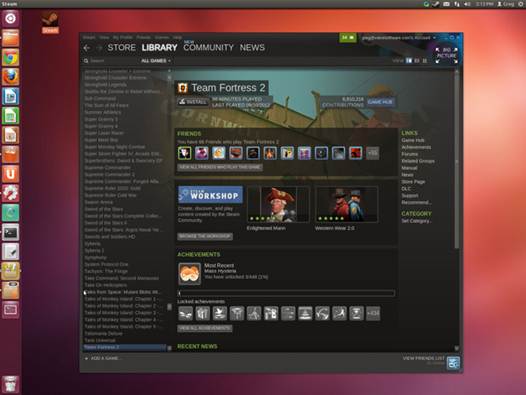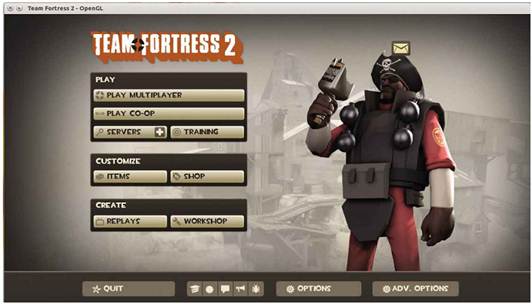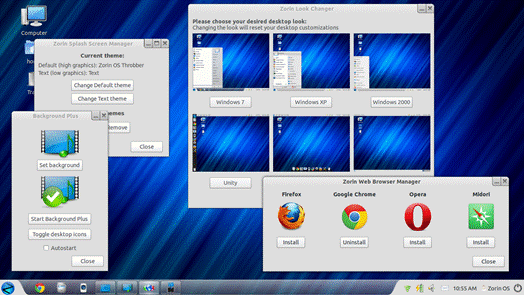The commercialisation argument will no
doubt be tossed to and fro over the coming months, more than likely with no
clear winner. If you take the pessimist’s point of view, then Linux as a whole
has the words ‘doom and gloom’ hovering over it in bold gothic type. With the
likes of Steam moving into Linux, Ubuntu and Canonical selling their souls to
the all-powerful dollar, heaps of free potential advertising space for a new
breed of user and more non open source material appearing for the OS, how long
would it be before Linux as we know it dies and from the remains emerges a closed-source
and very much paid for operating system?
In addition to the whole commercialisation
of Linux, we have now learned that Valve may be releasing a Steam driven (not
literally) gaming PC for the living room sometime next year. As Newell stated
recently, concerning the Steam Box, “Our hardware will be a very controlled
environment. If you want more flexibility, you can always buy a more general purpose
PC.” Perhaps this is what the Steam to Linux development has really been about?
Could Valve be modifying the Linux kernel to better suit a games console PC,
then adding the soon to be well tested Linux version of the Steam client to it
and closing the whole thing off before packaging and making an obscene profit
from the use of a free OS, along with a community tested client?

Steam on Ubuntu
This theory is, of course, akin to ripping
the pages out of a collection of copyright free books, then gluing them into
another and selling the final tome for a handsome profit. In the eyes of the
community it’s horrible and unethical, but in the eyes of the law it’s
perfectly legitimate.
Judging by last year, 2013 looks as if it
might be potentially fraught with glitches, bugs and serious lapses in security
for poor old Linux. There are always going to be problems and bugs, of course,
which the community will report, and they’ll subsequently be written out with a
suitable update from one of the many developers who support Linux and the
applications that run on it. However, 2012 seemed to be the year that brought
many bugs to light, some that were simple enough potential security issues
relating to a flaw in the kernel, flaws that were quickly found and removed.
It’s possible many of these bugs and risks were brought to the attention of the
public via malicious sources, but there’s no actual proof of this, and it’s one
for the conspiracy theorists to chew over. Regardless, the overall effect was
one that made casual users think that Linux isn’t as secure or as perfect as
its users like to believe not that the users of Linux ever stated that, but the
negative press could have been very damaging anyway.
The State Of Linux
The predictions and views stated so far may
border on the apocalyptic and paint a sorry picture of woe for the future of
Linux, but thing don’t have to be so bad.

The
games appear to be well met and perform adequately too
Ubuntu, for all its faults, may very well
be classed as a traitor to the ethos of Linux and free software, but it’s
pushing the boundaries of the operating system into new territories.
For most standard computer users, Windows
or Mac OS do the job nicely. They run the applications that the user requires,
they allow the user to surf with relative safety and the user can enjoy some
play time with their favourite game. That being the case, there’s very little
to offer the user to make the move to Linux. However, what we now have, thanks
to Ubuntu, Valve and so on is an operating system that can potentially do all
of the above while for the moment at least still being free to install and use.

Linux
Mint is probably one of the most loved Linux distros at the moment
Although it’s still difficult to persuade
the standard user to convert to Linux, Ubuntu et al have now covered all the
necessary bases for a good 90% of computer users. Office applications have been
around for years with releases of Ubuntu, as has the Gimp for those who
manipulate graphics, and now we have a gaming backbone that can soon see the
release of triple-A titles. Interestingly, in conjunction with this potential,
should these big names and titles start taking Linux more seriously, as has
Valve, then the problems that face the core of Linux (drivers, interoperability
with other platforms, fragmentation between distributions, desktop environment
wars and legal issues) could finally be laid to rest as the big names demand
more coherent standards. In fact, in view of the commercialisation of Linux, we
could see better standardisation.
Admittedly, this will clash with the ethos
of Linux and open-source. After all, the whole point of Linux is freedom. Once
we start having big commercial concerns dictating what they want from the
operating system, then we start to lose the very freedom that the operating
system was based on.
To be honest, the current state of Linux is
a bit of a mess. Distributions differ far too much and the vast majority are so
amateurish that it’s laughable. Desktop environments are so focused on beating
Unity and making themselves look flashy that they’ve lost the ability to be
useful and useable. And, taking into account the point of view of a new user,
some of the basic tasks require a knowledge of the terminal or, at the very
least, knowledge of what the obscure error messages are trying to say, which is
likely to frighten the life out of the new user.

Check
out Zorin OS Free: it certainly has some interesting features
All these issues are being worked on,
albeit in a time frame that matches the march of free software producing a
working, bug-free audio driver is a glowing mark on the CV of the developer,
but it’s not going to put bread on their table. In time we will see a
relatively bug free Linux distro that encompasses the requirements of the
standard user and matches the tolerances of the named companies who are willing
to invest their time and finances. When this will be is anyone’s guess, but the
sudden lurch of Linux popularity with named individuals and companies could
make this utopian Linux distro appear sooner rather than later.